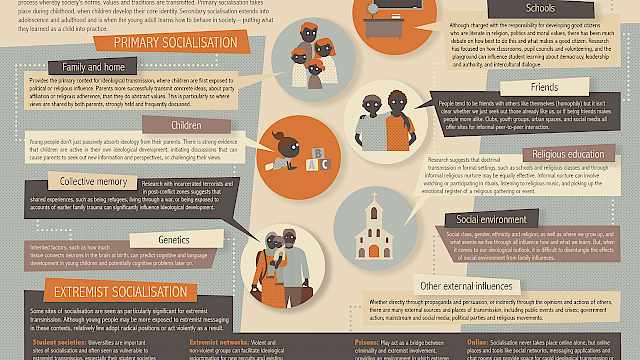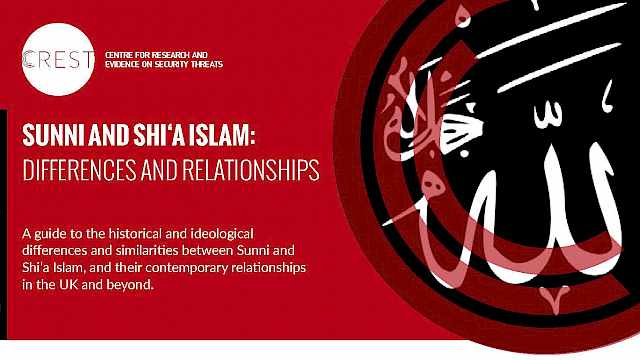
Actors and Ideologies in Social Context
This Programme improves our understanding of where and how extremist ideologies are transmitted and learned, and why and how people engage and disengage from terrorist violence. Led by Professor Kim Knott at Lancaster University.
This programme examines the backcloth of economic, political, societal and global security perspectives that shape the perceptions and realities of security threats.
Through original research, knowledge synthesis and collaborative research with practitioners, the programme aims to improve understanding of the conditions under which extremist ideologies are passed on, individuals and groups are radicalised, and a minority make the move to violence.
Better knowledge of the process, locations, events and relationships involved in ideological transmission is vital for future development and targeting of interventions, disruption, and counter-narratives
Ideological learning in extremist contexts
There is little research on how, as learners, novice extremists set about acquiring in-depth ideological knowledge. Nor is there a good understanding of when and why the development of ideological expertise can deepen commitment to a cause or support disengagement. This research examines how learners access, internalise, and use ideological knowledge in different contexts, including both group- and lone-learning, and considers what factors shape these processes. It builds on a framework developed from an earlier interdisciplinary review of research on ideological transmission.
The research is intended to improve understanding of radicalisation and deradicalisation pathways, and to act as a source of guidance for security practitioners who need to develop in-depth understandings of extreme ideologies. Tracing the journey from novice to expert may help locate the points at which people may be receptive to altering ideological commitments. Understanding the value of different learning strategies and types of ideological material can inform policy and practice relating to proscription and counter-messaging.
- Kin and peer contexts, ideological transmission and the move to extremist involvement
This doctoral project enhances understanding of the ideological and social impact of family members and friends by connecting social network analysis of terrorist individuals and groups, psychological research on terrorist biographies, and studies of intergenerational and peer-to-peer transmission. - Gender and violent extremism
This doctoral project examines the gendered roles, mechanisms and practices which support violent extremism. Can underlying structures, drivers and beliefs be identified, and how and when do they differ for men and women? How have women’s roles as enablers of terrorist engagement or obstacles to disengagement changed? - Learning and communication in transnational militant groups
This doctoral project examines how transnational extremist networks tailor communications to their respective audiences. It problematises the traditional concept of ‘extremist groups/organisation’ by looking at how affect and inter-subjective meaning are co-created in wider extremist networks. The project compares these processes in jihadi and right-wing networks.
Completed research projects
- Grassroots counter-messaging online: building resistance in civil society
This project deepened understanding of counter-messaging and the types of content created by individuals outside officially recognised programmes. It looked at the motivations of activists who produce counter messages, and the effectiveness of their content. It considered the risks and rewards they face. - Reciprocal radicalisation
This project tested theories of reciprocal radicalisation using a case study of extreme right web forums in the aftermath of four violent incidents in 2017, three inspired by violent Islamism, another with extreme right motivations. It examined how digital milieus react to violent attacks by ideological opponents and assessed the extent to which extreme-right adherents see themselves as coupled to militant Islamism. It asked how online rhetoric develops in response to militant Islamist violence. As part of the project, a workshop was held to co-ordinate current research on reciprocal radicalisation and to bring together security practitioners and academic researchers. A summary and papers were presented online.
Research reviews
Ideological transmission
An interdisciplinary review of social science and humanities research on ideological transmission produced three CREST reports, on the family, peers and religious and political organisations. This led to new research on ideological learning.
On ideological transmission in families: It has long been assumed that ideology is passed from parent to child, however empirical support for this is mixed. Our research review found that:
- Concrete principles, such as political and religious affiliation and preference, are more successfully transferred between generations than more abstract ones, such as values
- Family members exert different effects on transmission
- Family agreement on beliefs and values can boost transmission, as can the salience of issues
- Some methods (e.g., rote learning and regular ritual) are more effective than others
- Children are not passive agents in the process; they are actively involved
- Offspring sometimes defy parents and resist their influence
- The transmission of hatred differs across groups: social revolutionary terrorists are generally more likely to disagree with and defy parents; national-separatist terrorists more likely to feel they are righting the wrongs experienced by earlier generations.
Muslims and Islam in the UK
This annotated report synthesised open-source, humanities and social science research on British Muslims and Islam. It examined the history and demography of British Muslims and their communities, families, gender and generation, secular and cultural identities, mosques, and educational issues. Transnational connections, Islamic movements and networks, and civil society organisations and campaigning groups were also discussed. A series of short guides were produced to accompany the longer report. They were intended to inform and enrich discussions about Muslims in the UK, and to challenge assumptions.
Project resources
Academic Publications
Ideological Transmission in Extremist Contexts: Towards a Framework of How Ideas Are Shared
Despite their centrality in academic and policy debates about radicalization and political violence, ideologies have been conceived narrowly, as cognitive, top-down, coherent and systematic.
In general, those who have used the concept of ideology have failed to draw on ideological theory or on recent insights about its practice and embodiment, or location in space and time.
Our interest is less in the content of ideology than in how it is shared by those for whom it matters. We offer an interpretive framework, based on six key questions about ideological transmission: What ideas, beliefs, and values are shared, how and why, by whom, and in which spatial and temporary contexts?
Following a discussion about the methodological pros and cons of the framework, it is tested on a series of interviews with members of Aum Shinrikyo, the Japanese religious group responsible for the Tokyo subway attack in 1995. We assess the strengths and limitations of the framework for analysing the various dimensions of ideological transmission before considering what it adds to our understanding of the relationship between extreme beliefs and violent behaviour.
(From the journal abstract)
Benjamin Lee, Kim Knott. (2022) Fascist aspirants: Fascist Forge and ideological learning in the extreme-right online milieu. Behavioral Sciences of Terrorism and Political Aggression 14:3, pages 216-240.
Countering Violent Extremism Online: The Experiences of Informal Counter Messaging Actors
The online space is a haven for extremists of all kinds. Although efforts to remove violent and extremist content are increasing, there is a widely accepted need to also contest extremist messages with counter messages designed to undermine and disrupt extremist narratives.
While the majority of academic focus has been on large and well‐funded efforts linked to governments, this article considers the experiences of informal actors who are active in contesting extremist messaging but who lack the support of large institutions.
Informal actors come without some of the baggage that accompanies formal counter message campaigns, which have been attacked as lacking in credibility and constituting “just more government propaganda.” This has been noted by some of the wider countering violent extremism industry and the appetite for incorporating “real‐world” content in their campaigns seems to be rising.
This article fills a gap in our knowledge of the experiences of informal counter messaging actors. Through a series of in‐depth qualitative interviews it demonstrates that, despite the potentially serious risks of incorporating greater levels of informal content, there is an appetite among informal actors to engage with formal campaigns where they can be selective over who they work with and maintain a degree of control.
(From the journal abstract)
Benjamin Lee, 2019. Countering Violent Extremism Online: The Experiences of Informal Counter Messaging Actors. Policy & Internet. https://doi.org/10.1002/poi3.210
Informal Countermessaging: The Potential and Perils of Informal Online Countermessaging
Online countermessaging—communication that seeks to disrupt the online content disseminated by extremist groups and individuals—is a core component of contemporary counterterrorism strategies. Countermessaging has been heavily criticized, not least on the grounds of effectiveness. Whereas current debates are focused on the role of government and large organizations in developing and disseminating countermessages, this article argues that such approaches overlook the informal production of countermessages. Recognizing the appetite for “natural world” content among those engaged in countermessaging, this article highlights some of the potential benefits of informal approaches to countermessaging. At the same time, the article also acknowledges the risks that may result from closer working between countermessaging organizations and informal actors.
(From the journal abstract)
Benjamin Lee. 2018. ‘Informal Countermessaging: The Potential and Perils of Informal Online Countermessaging’. Studies in Conflict & Terrorism: 1–17. https://doi.org/10.1080/1057610X.2018.1513697.
Applying the Study of Religions in the Security Domain: Knowledge, Skills, and Collaboration
Since the 1990s, scholars of religion on both sides of the Atlantic have been drawn into engagement with law enforcement agencies and security policymakers and practitioners, particularly for their expertise on new religious movements and Islam. Whilst enabling researchers to contribute to real-world challenges, this relationship has had its frustrations and difficulties, as well as its benefits and opportunities. Drawing on examples from the UK, Canada, and the US, I set out the relationship between religion and the contemporary security landscape before discussing some of the key issues arising in security research partnerships. I then turn to the question of knowledge exchange and translation in the study of religions, developing the distinction between ‘know what’ (knowledge about religions and being religiously literate), ‘know why’ (explaining religions and making the link to security threats), and ‘know how’ (researcher expertise and skills in engagement with practitioners).
(From the journal abstract)
Kim Knott. 2018. ‘Applying the Study of Religions in the Security Domain: Knowledge, Skills, and Collaboration’. Journal of Religious and Political Practice, 4 (3): 354–73. https://doi.org/10.1080/20566093.2018.1525901.
Telling Stories of Terrorism: A Framework for Applying Narrative Approaches to the Study of Militant’s Self-Accounts
Narrative has recently garnered much attention in the study of terrorism but remains poorly understood. This paper offers some initial steps towards translating the promise of narrative approaches into a set of steps for systematically analysing and understanding terrorists’ own accounts of their engagement with extremism and militancy. This approach rests on the assumption that terrorist authored accounts are more than post-hoc rhetorical exercises that aim to persuade others, or even the authors themselves, of the righteousness of their political cause or otherwise mitigate their responsibility for their involvement in violence. In particular, I advance a framework for methodically applying narrative approaches to terrorist authored texts, in particular, autobiographies. In doing so, I will demonstrate how this approach can help better comprehend how individuals involved in militancy understand the world, draw upon existing narrative resources and give meaning to their actions.
(From the journal abstract)
Simon Copeland. 2018. ‘Telling Stories of Terrorism: A Framework for Applying Narrative Approaches to the Study of Militant’s Self-Accounts’. Behavioral Sciences of Terrorism and Political Aggression: 1–22. https://doi.org/10.1080/19434472.2018.1525417.
‘It’s not paranoia when they are really out to get you’: the role of conspiracy theories in the context of heightened security
Conspiracy theories have been seen as important supporting components in extreme political beliefs. This paper considers conspiracy theories in the counter jihad movement, an international network combining cultural nationalism with xenophobia towards Muslims.
This paper evaluates the nature of conspiracy belief through the analysis of several key texts published by counter jihad activists, and of content published on a daily basis by three core websites. The findings show the Islamisation conspiracy theory to be highly modular, with authors able to mix and match villains.
The analysis of daily published content demonstrates that, at the routine level, conspiracy theory is rarely used openly as a call to action.
This is in keeping with other examples of conspiracy theory in extreme right wing movements in which conspiracy is seen as justification for existing prejudices. However, the political and security context the counter jihad operates in also affords the movement opportunities to support some of their claims, often by reproducing or reinterpreting mainstream or quasi-mainstream reporting, without reverting openly to conspiracy tropes.
In the case of the counter jihad movement, as well as potentially other far-right movements, conspiracy theory may be taking a back seat to a more sophisticated public relations approach.
(From the journal abstract)
Lee, Benjamin J. 2017. ‘It’s Not Paranoia When They Are Really out to Get You: The Role of Conspiracy Theories in the Context of Heightened Security’. Behavioral Sciences of Terrorism and Political Aggression 9 (1): 4–20. https://doi.org/10.1080/19434472.2016.1236143.








































